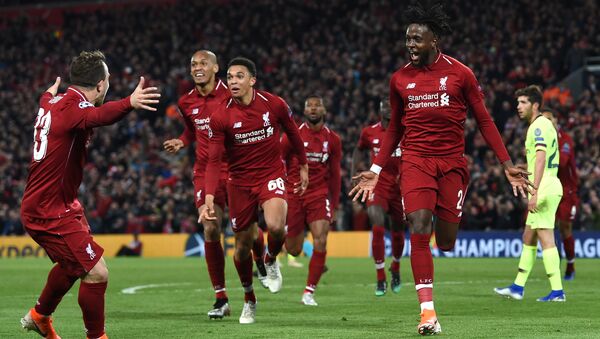BT Sport is expected to confirm shortly it will be showing the Champions' League final between Liverpool and Tottenham live on YouTube on 1 June.
The success of English clubs in this year's competition — Manchester City also made it as far as the semi finals — has been a massive boost for BT Sport, who paid a whopping £1.2 billion, outbidding Sky Sports, for the right to show the Champions' League in 2017.
Viewing figures for Europe's premier competition had dropped prior to 2017, as it was no longer available on terrestrial TV and Spanish clubs dominated the tournament with either Real Madrid or Barcelona winning it for the previous four seasons.
When you remember we’re in the Champions League final. pic.twitter.com/Z1mAgaxCrf
— — (@AnfieldRd96) 16 May 2019
Last year Liverpool made it to the final, only to lose to Real Madrid, and this year they are back, taking on Spurs, who have never reached the final of the Champions' League or its predecessor, the European Cup.
BT Sport, who have the TV rights until 2021, make their money from a mixture of advertising and subscriptions.
They are believed to have around two million subscribers now, still a long way behind Sky's six million.
But as in the previous three seasons BT Sport has reportedly agreed to stream its coverage of the final from the Wanda Metropolitano Stadium in Madrid live on YouTube on Saturday 1 June.
📆 17 May 2006:
— Football on BT Sport (@btsportfootball) 17 May 2019
Henrik Larsson turns the Champions League final on its head.
He comes off the bench to set up both of Barcelona's goals and break Arsenal hearts.
💔pic.twitter.com/ZMHIZAZaVW
That may come as a blow to thousands of British publicans as many hard-up football fans might eschew the idea of watching the game in a crowded pub where they have to pay £5 for a pint of beer, and instead invite friends round to watch it at home on YouTube on their smart TVs with cans of beer at a fraction of the price.
Few other companies give away their sports coverage for free on YouTube like BT Sport does.
YouTube was launched in February 2005 by three employees of PayPal — Jawed Karim, Steve Chen, and Chad Hurley — who realised the internet needed a central hub where video clips could be shared and commented on.
All tickets for our @ChampionsLeague Final against Liverpool in Madrid have now sold out.
— Tottenham Hotspur (@SpursOfficial) 17 May 2019
In the unlikely event that we receive any cancellations, these tickets will be offered to Season Ticket Holders who have not purchased a ticket in Ticketing Point order.#UCL ⚪️ #COYS
Karim would later say it was the 2004 Superbowl — when Janet Jackson's nipple was shown to an audience of millions after her infamous "wardrobe malfunction" during an appearance with Justin Timberlake — which was his lightbulb moment.YouTube was a phenomenal success — with 72 million individual visitors ech month and 100 million videos viewed every day — and in October 2006 it was bought by Google for an astonishing $1.65 billion.
Who needs massive corporations spending millions on travel shows (and lying to you about eastern European countries) when one dude with a camera can give you a far more entertaining, intimate and authentic experience? Best channel on YouTube right now. https://t.co/9Wt8JZLENb
— Paul Joseph Watson (@PrisonPlanet) 17 May 2019
In recent years live streaming and the rise of "YouTubers" — influencers such as PewDiePie, Logan Paul, El Rubius, DanTDM, Shane Dawson, JuegaGerman, Yuya and JackSepticEye — have boosted the platform.
Last year Fortnite set a record for the most people streaming an event on YouTube — 1.1 million people.
By 2015 YouTube had a billion users and a turnover of $4 billion but it was only "breaking even".
As of February 2017, there were more than 400 hours of content uploaded to YouTube each minute, and one billion hours of content being watched on YouTube every day. In August 2018 it was ranked as the second-most popular website in the world.
Congratulations to @realstoriesdocs for winning Best Short Form Program at the @BAFTA Television Awards in London with their original film, Missed Call. The first ever BAFTA win for a YouTube first program! Watch here → https://t.co/XkeeWsPoaF pic.twitter.com/lXLqpr1a33
— YouTube (@YouTube) 13 May 2019
In fact YouTube has never made a profit and yet it is one of the most well known brands in the world and highly coveted by a number of media organisations and conglomerates.
YouTube makes a lot of money from selling adverts, which viewers are forced to watch before they can access videos, and it also earns money from selling premium subscriptions and YouTube music subscriptions, where they are competing with Spotify and Apple Music.
But it remains a very expensive operation to run — paying out large sums in royalties, bandwidth, storage and processing.
29th May:
— Uber Chelsea FC 🏆 (@UberCheIseaFC) 13 May 2019
Arsenal beat Chelsea in the Europa League Final.
30th May:
Real Madrid announce Hazard signing.
1st June:
Tottenham win the Champions League. pic.twitter.com/u7YLfIrdAU
Google has tried to work out various ways of monetising the platform but it remains stubbornly unprofitable.
YouTube has been transformed in recent years by the advent of smart TVs, which allow people to view YouTube on a large screen in the comfort of their living rooms or bedrooms.
In 2016 Endgadget predicted that in the near future around half of all under-30s will not pay for any TV subscription because of YouTube.
So it may be that for big events like the Champions' League final the go to place will be YouTube.


